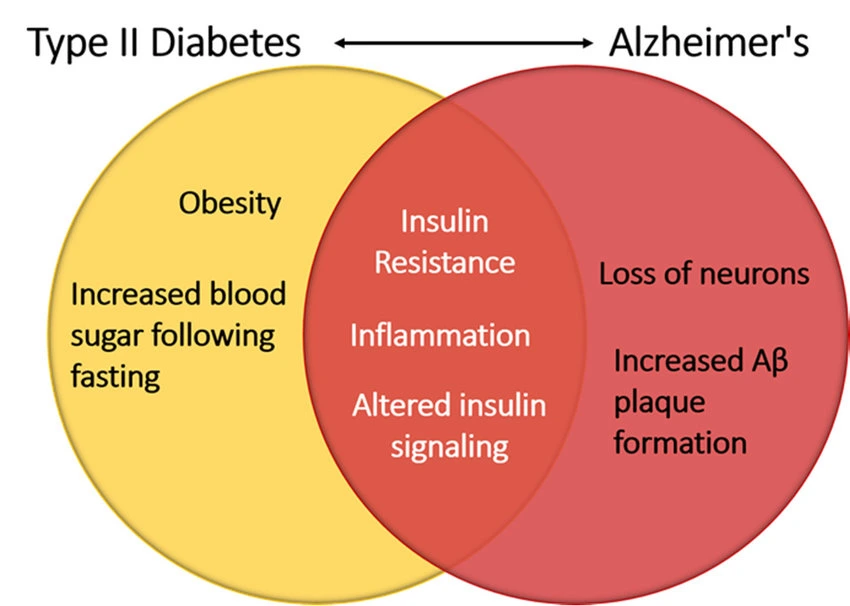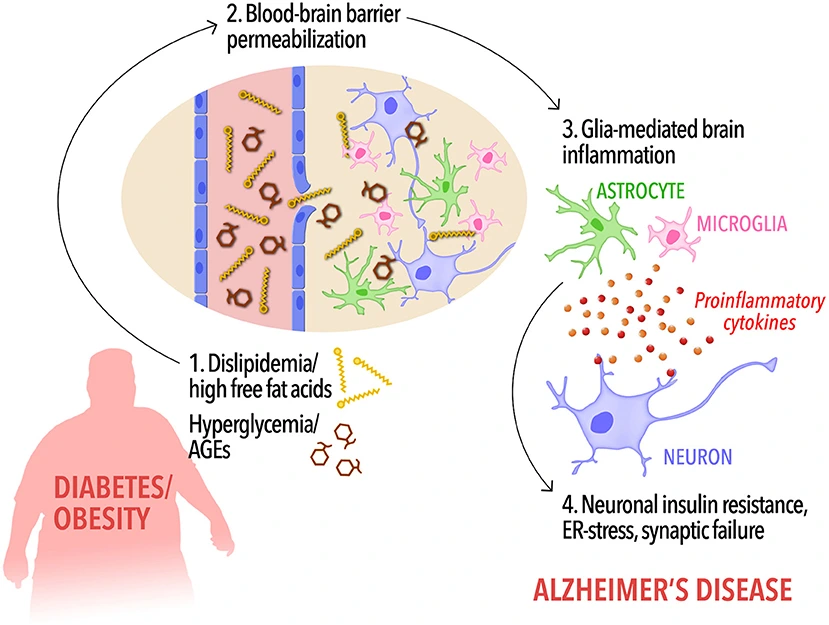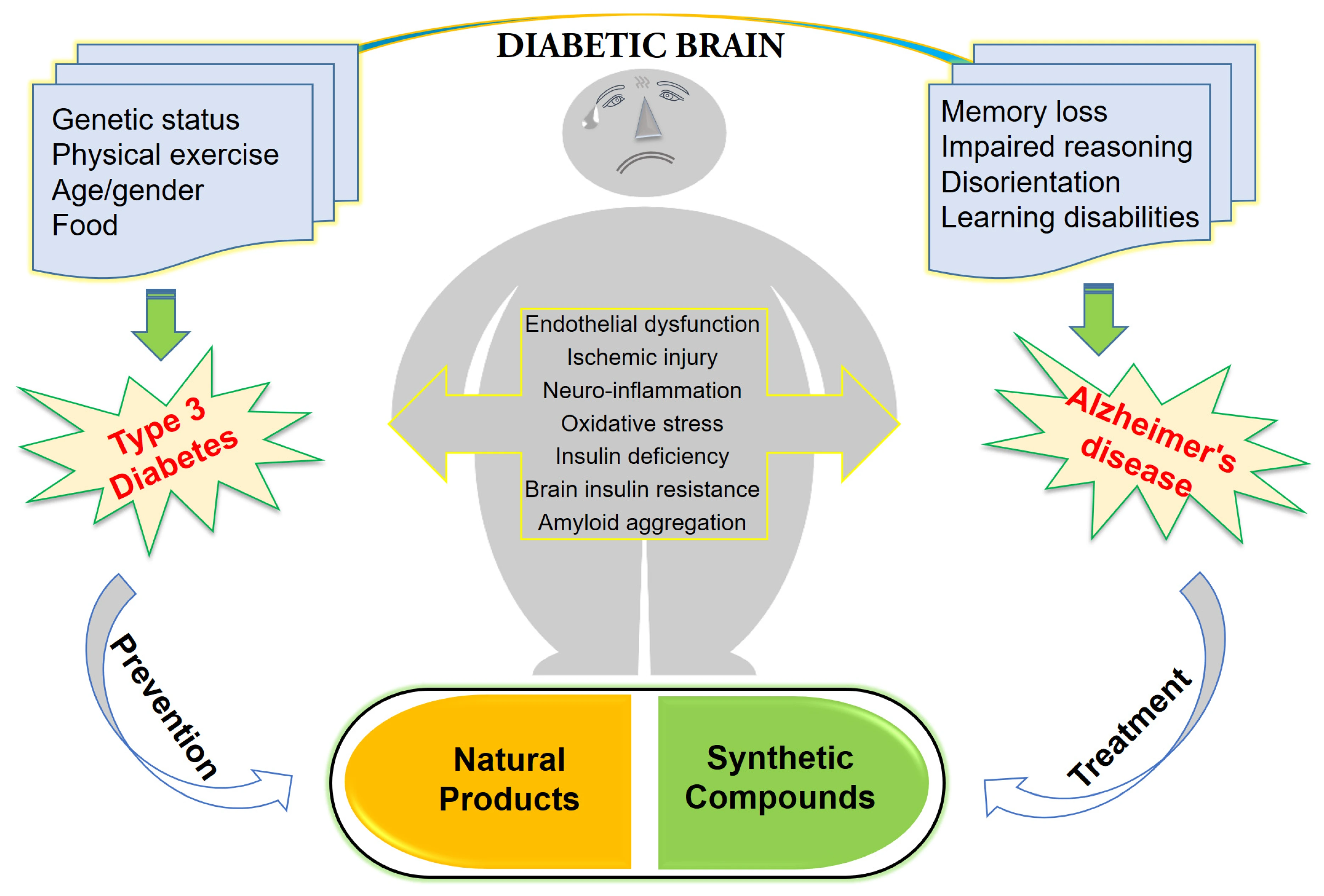Last updated on April 9th, 2022
Diabetes might enhance the risk of Alzheimer’s disease. However, a healthy diet, blood glucose control, and exercise might help. There are a lot of studies suggesting an association between diabetes and Alzheimer’s, even though those associations aren’t yet completely understood. Not all studies verify the association, but many do recommend that diabetic patients, particularly type 2 diabetes, are at a greater risk of developing Alzheimer’s dementia or other types of dementias. Research is still indistinct on whether exercising steps to avoid or control diabetes might assist in lowering the risk of cognitive impairment.
Because of increasing rates of obesity, inactivity, and an aging population, diabetes type 2 is more widespread in society than ever before. The mortality rate from diabetes fell from 2000 to 2010 in high-income countries, however, it enhanced from 2010 to 2016, giving rise to an overall 5% amplification in premature mortality rates since 2000. Chiefly disturbing is that diabetes type 2 is now being seen recurrently in children, owing to their inactivity as well as obesity.

Source: Researchgate
It has been identified for several years that diabetes type 2 amplifies the risk for heart ailments like stroke. Current studies have found that diabetes also amplifies the risk of dementia. The age of onset of diabetes makes a difference in the risk of emergent dementia.
Studies establish that individuals having prediabetes or type 2 diabetes are at a greater risk of getting Alzheimer’s disease as well as other types of dementia afterward in life. Scientists believe that there are some ways that difficulties with blood glucose control might give rise to difficulties with a person’s memory and thinking.
Alzheimer’s disease is a disturbing medical condition that results in confusion, memory loss, and perplexity. Previous research using a large group of individuals having type 2 diabetes recommends there is an association between these two health problems, as older individuals having type 2 diabetes are at a greater risk of developing Alzheimer’s.
Individuals having type 2 diabetes experience insulin resistance, where the body cells fail to respond appropriately to the hormone insulin. This results in a gradual rise in the levels of blood sugar. This insulin resistance could be adding to the development of Alzheimer’s disorder.
Insulin resistance could affect the action of a protein named Tau, which stops functioning properly in the brains of individuals having Alzheimer’s disorder. Tau gets modified forming rope-like structures, referred to as tangles. Generally, the brain cells are capable of removing these tangles, however, insulin resistance might prevent this ‘untangling’ from occurring.

Understanding the Association Between Diabetes and Alzheimer’s
Diabetes might result in numerous complications, like damage to the blood vessels. Diabetes is measured as a risk factor for vascular dementia. This form of dementia happens to owe to brain damage that frequently results due to decreased or blocked blood supply to the brain. A lot of individuals having diabetes have brain modifications that are symbols of both Alzheimer’s disorder as well as vascular dementia. Few studies believe that both conditions fuel the damage caused by the other.
Ongoing studies are aimed at better understanding the association between Alzheimer’s and diabetes. That association might happen due to the complex ways that diabetes type 2 influences the capacity of the brain as well as other body tissues to utilize glucose and react to insulin.

Diabetes might also enhance the risk of developing mild cognitive impairment. Mild cognitive impairment (MCI) is a medical condition in which individuals experience more thinking (cognitive) as well as memory issues than are generally existing in usual aging. Few studies indicate that diabetes might enhance the risk of MCI deteriorating to dementia. MCI might precede or go together with Alzheimer’s disorder or other forms of dementia. As researchers assess the association between diabetes as well as Alzheimer’s, they’re also studying probable approaches to stop or treat both ailments.
Also Read: Normal Sugar Level Chart

Insulin Resistance
When the body cells fail to utilize insulin the way they should, that influences the mechanics of the brain.
- The body cells fail to get the fuel they require; thus, a person’s brain can’t function right.
- The blood glucose goes up, and with time, that may result in damaging fatty deposits in the blood vessels.
- An excess of insulin might discard the balance of chemicals in a person’s brain.
These brain effects are so strong that some scientists sense that Alzheimer’s associated with insulin resistance must be known as “type 3 diabetes.”
Inflammation as well as blood vessel damage
With diabetes, you’re at greater risk for a heart attack or stroke. And high blood sugar levels can trigger inflammation. None of that is good for your blood vessels. Damaged vessels in your brain could lead to Alzheimer’s. Inflammation can also make your cells insulin resistant, especially if you’re obese.
Blocked nerve communication
High blood glucose has been seen to be associated with greater levels of protein pieces named beta-amyloid. When these mass together, they get trapped between the nerve cells in the person’s brain as well as block signals. The major trait of Alzheimer’s is the nerve cells that fail to talk to each other.
How Diabetes Can Cause Dementia?
There are numerous reasons why patients with type 2 diabetes progress to dementia. One reason is associated with the effects that diabetes puts on a person’s heart, as cardiovascular health is directly associated with brain health. Cardiovascular disease as well as raised blood pressure both are found to be related to stroke that, in turn, might cause dementia. On the other hand, strokes do not seem to be the broad answer, as few research studies found that diabetes led to an enhanced risk of dementia even when strokes were regulated for.
Another factor belongs to the incidents of hypoglycemia that frequently happen in diabetes. Even though tight regulation of blood glucose levels has been found to lower down the chronic risks of heart problems and strokes, tight regulation may also cause hypoglycemia, memory loss, as well as dementia. The reason is likely being as the levels of low blood glucose are found to damage the hippocampus, the memory center of a person’s brain.

One of the more interesting suggestions is that diabetes directly results in Alzheimer’s disorder. Certainly, Alzheimer’s disorder has been known by the name type 3 diabetes due to shared molecular as well as cellular features among diabetes or Alzheimer’s. For instance, insulin plays a key role in forming amyloid plaques, as well as insulin plays a key role in the phosphorylation of tau, which gives rise to neurofibrillary tangles. In other words, while insulin resistance in the body might bring about type 2 diabetes, insulin resistance in the brain might give rise to plaques or tangles of Alzheimer’s disease.
Lowering Down The Risk
Discussing with a health care team to avoid diabetes or manage diabetes has been found to be a successful approach to prevent or lessen the complications. The prevention of diabetes or effective diabetes care might also assist in preventing Alzheimer’s disorder and other dementias.
The good news is that a person might lessen the risk of type 2 diabetes as well as the risk of dementia. Discussion with a doctor is a must about the lifestyle modifications. Below mentioned life changes are useful even if a person has a diagnosis of diabetes or prediabetes.
Avoiding diabetes or managing it effectively might assist a person in preventing other complications including:
- Heart disorder
- Renal disorder
- Stroke
- Digestive issues (gastroparesis)
- Eye damage
- Bone or joint problems
- Nerve damage, which might result in pain in the feet or hands (diabetic neuropathy)
Steps to avoid or manage diabetes as well as prevent potential complications such as:
- Follow the concerned health care team’s suggestions regarding the most suitable plan for monitoring the levels of blood sugar, cholesterol as well as blood pressure.
- Consume healthy foods, such as fruits, veggies, lean meats, whole grains, as well as low-fat milk and cheese.
- If a person is overweight, it is a must to have a healthy diet and exercise to lose weight. Obesity might result in diabetes and other health issues.
- Avoid smoking.
- Assess the feet on a daily basis for sores.
- It is a must to exercise for a minimum of half an hour every day.
- Consume the suggested medicines as per schedule.
Finally, a positive attitude, engaging in social activities, learning new things, as well as music can all help a person’s brain function at its best as well as lower down the risk of dementia.
Evidence proposes that diet or activity alterations that result in weight loss are particularly effective in lessening the risk of diabetes. Even slight steps can create a huge difference. In a major research study, people with blood glucose levels somewhat above normal (prediabetes) cut their risk of developing diabetes type 2 by above 50% via exercise (half an hour five days a week) as well as little as a 5 to 7% loss in body weight.
Summary
Alzheimer’s disorder has become one of the most menacing ailments in the elderly, as well as type 2 diabetes is a chief health issue worldwide, signifying 7.4% of the population. People having type 2 diabetes, particularly undiagnosed diabetes, are at a greater risk of this type of damage. Moreover, diabetes might bring about chemical imbalances in a person’s brain, which might activate Alzheimer’s. in addition, high levels of blood glucose might result in inflammation, which might bring about damage to brain cells. For these reasons, diabetes is measured as one of the risk factors for a condition named vascular dementia. When the sugar levels go uncontrolled, excess glucose remains in the blood. With time, this may impair body organs, such as the brain. Diabetes elevates the risk of cardiovascular disorder and stroke, which damage the heart as well as blood vessels. Damaged blood vessels in the brain might add to Alzheimer’s disorder. High blood glucose results in inflammation. This might impair brain cells as well as help Alzheimer’s to develop.
FAQs:
Can diabetes result in memory loss or confusion?
Memory loss or overall cognitive damage, which are both the signs of Alzheimer’s, might be seen to be associated with diabetes type 2. Damage to the blood vessels most commonly occurs in individuals having diabetes. This damage might give rise to cognitive problems or vascular dementia.
Is Alzheimer’s hereditary?
Family history is not essential for a person to develop Alzheimer’s. On the other hand, research study shows that people having a parent or sibling with Alzheimer’s are more expected to develop the illness as compared to people who do not have a first-degree relative having Alzheimer’s.
Can cutting out sugar reverse dementia?
Eating sugar and refined carbs can cause pre-dementia and dementia. But cutting out the sugar and refined carbs and adding lots of fat can prevent, and even reverse, pre-dementia and early dementia.
What is the number one food that fights dementia?
Green leafy vegetables are probably the number one food that fights dementia. They have a strong, positive effect on cognitive health.
How does diabetes type 2 influence memory?
Research studies have found that individuals having diabetes type 2 are at enhanced risk for Alzheimer’s disorder. Also, they are more expected to get vascular dementia, memory loss resulting from the damage of blood vessels and poor blood supply to the brain.
Can glucose deteriorate dementia?
A recent study shows that even in individuals without diabetes, above standard blood glucose is related to an enhanced risk of developing dementia.
References:
- https://www.mayoclinic.org/diseases-conditions/alzheimers-disease/in-depth/diabetes-and-alzheimers/art-20046987
- https://www.health.harvard.edu/blog/whats-the-relationship-between-diabetes-and-dementia-202107122546
- https://www.diabetes.org.uk/research/our-research-projects/south-east/untangling-link-between-type-2-diabetes-and-alzheimers-disease
- https://www.alz.org/national/documents/latino_brochure_diabetes.pdf
Last Updated on by Dr. Damanjit Duggal
Disclaimer
This site provides educational content; however, it is not a substitute for professional medical guidance. Readers should consult their healthcare professional for personalised guidance. We work hard to provide accurate and helpful information. Your well-being is important to us, and we value your feedback. To learn more, visit our editorial policy page for details on our content guidelines and the content creation process.

 English
English










